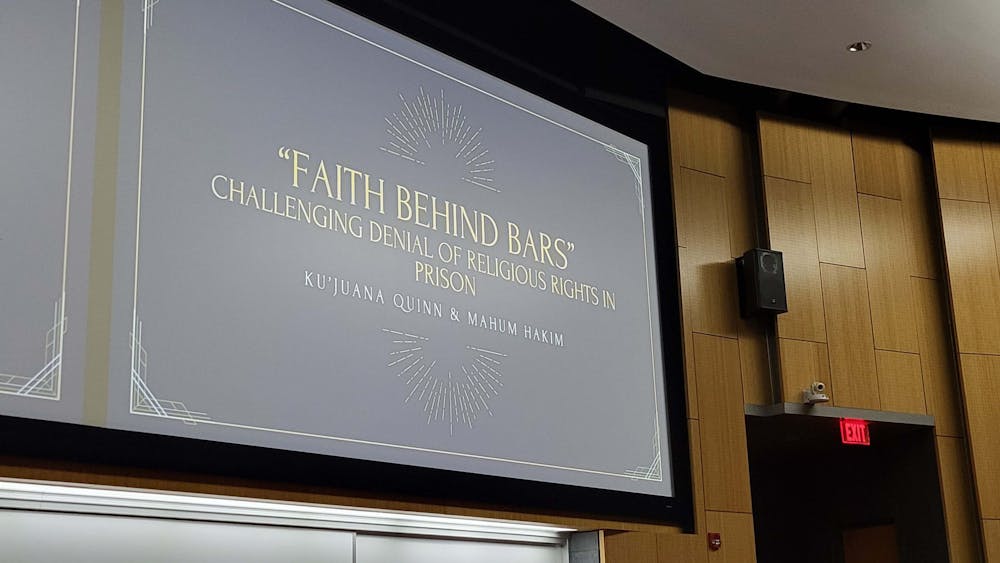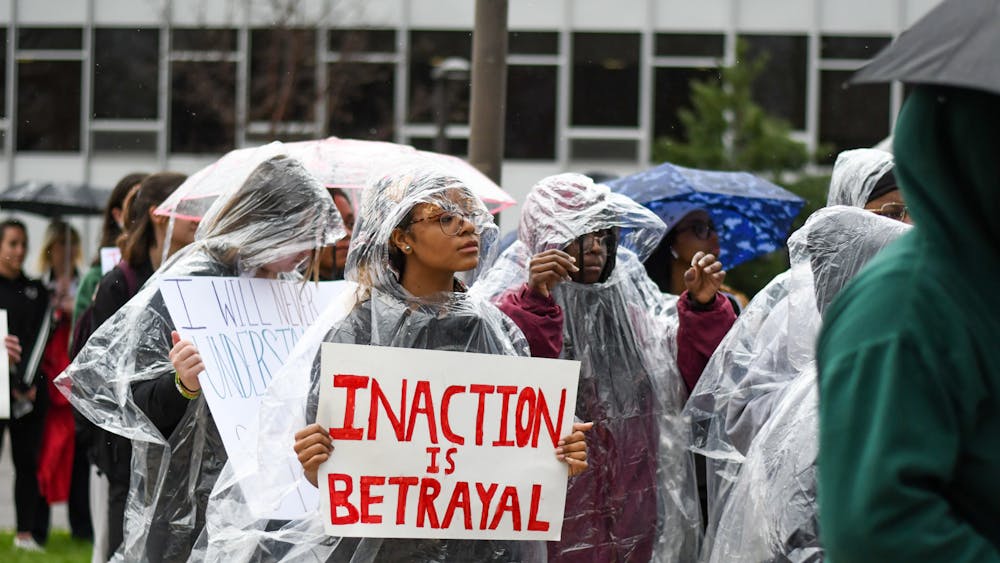Greek Life: Breaking down stereotypes, building community, philanthropy, character
Greeks at Central Michigan University are a family.
When an individual or group faces sanctions or is booted from the kin, the effects span further than just the violators.
“We’re very tight-knit and it’s always sad when something happens to another chapter,” said Farmington Hills senior Hannah Keshishian, a member of Phi Mu. “We take care of each other and no one wants to ever see anything happen to a fellow Greek.”
When a handful of members provide the community with negative exposure, disciplining them can be vital to the community and campus.
News regarding the four-year suspension of the Delta Chi fraternity has taken the bulk of the headlines surrounding the Greek community at CMU this year. The chapter was booted from campus after allegations arose of an alcohol violation, sexual assault, theft and the taking and sending of lewd photos after an April 19, 2013 post-Greek Week party.
Interfraternity President Casey Lang said he understands looking at the big picture when it comes to the punishment of violators for the common good.
“A lot of times, when a chapter gets kicked off, it needs to be kicked off because it’s doing something either unsafe or doing something harmful to Greek Life,” Lang said. “It doesn’t mean the organization is bad, it just means some people in that chapter made bad decisions.”
Going Greek
Lang’s path to Greek Life at CMU wasn’t the common route.
Originally an ROTC cadet, the Florida senior sought out a change of scenery and support after tragedy struck during his sophomore year.
“One of my best friends and fellow cadets took his own life a few years back,” Lang said. “After that, I went searching for a new sense of meaning and belonging. The people I hung out with before didn’t seem to fit as well without (him).”
Joining Pi Kappa Phi, he was surrounded by exactly what he needed.
“I found a place where people really help each other, who were there for each other, and who help you take what life throws at you and make a better person of yourself,” Lang said.
The Greek community consists of about 43 social, honorary, multicultural, academic and service fraternities and sororities. Each group has varied traditions and characteristics, all focusing on education, character development and charity.
Its familial nature attracts students of all backgrounds and disciplines, seeking a home away from home during their college years.
Roughly 1,300 students make up the 30 social organizations at CMU.
“There are the people who come for the party, and there are the people looking for a home,” said Grass Lake junior and Phi Kappa Tau member Nick Waskiewicz. “People have various reasons (for joining) and Greek Life allows you to grow and build your own experience.”
Waskiewicz’s social personality left him wanting more after his first two years at CMU.
Although he built up his friend group as a resident assistant in Woldt Hall, he wanted more.
“Being an RA, lots of people know me, which is great, but opening myself up to Greek Life, I have met so many more people," Waskiewicz said. "It’s wonderful because it’s what I’m passionate about. I joined because I was looking to build deeper relationships with people.”
Though a happy member of Phi Kappa Tau today, Waskiewicz was hesitant to rush his first two years because of the negative stereotypes associated with Greek Life.
Overcoming stereotypes
Years of hazing and alcohol-related stories have paired with films like “Animal House” to paint a negative portrayal of Greek Life nationally.
The stereotypes aren’t going away anytime soon, Lang said, but they don’t fit the entire community either.
“They portray fraternity men as drunken fools to some extent, who care far too much about drinking than they do their grades and their community,” he said. “From what I’ve seen, I don’t think that’s the case.”
Like other registered student organizations, Greeks require a 2.5 GPA to retain membership. Some groups raise the bar higher when it comes to academic standards, and many require logged study hours.
All social sororities also prohibit drinking in their main houses and many don’t allow alcohol consumption while wearing Greek letters. Strict rules to eliminate underage and excessive drinking are put in place by both CMU and each Greek group to prevent trouble.
Having to pay dues to their national chapters cause groups to receive another negative perception. While some suggest Greeks "purchase" their friendships, Keshishian challenged that idea.
“I can assure you that if that was true, then I definitely did not pay enough,” she said. “You join other RSOs on campus, you pay dues, you have bylaws and constitutions that you follow. You have GPA requirements, and above all, you (make) bonds and (become) friends with those people.”
Partying is often the first thought associated with sororities and fraternities. Although social functions are commonplace, Waskiewicz said partying is only a small part of Greek Life.
“The partying, it happens, but it’s not the reason we’re here,” Waskiewicz said. “We’re here to get to know one another, to leave this campus better than how we found it.”
Proving their worth
Greek Week 2014 exemplified the accomplishments of fraternities and sororities in the Mount Pleasant community. In five days, the groups worked tirelessly to host events on campus and raised more than $30,000 – a Greek Week record.
Outside the annual fundraising week, each group has an associated philanthropic organization and raises money year round to provide for people in need.
Zeta Tau Alpha raises an average of $20,000 annually for breast cancer research. Alpha Sigma Tau raises about $3,000 each year for Pine Mountain Settlement school in Kentucky, according to Panhellenic Council President Veronica Meadows.
Other philanthropies include Children's Miracle Network, Habitat for Humanity, Victims of Domestic Violence, Big Brothers Big Sister and the National Kidney Foundation.
“I think our role in the community is something that we have been working on,” Meadows said. “A lot of Greeks volunteer at the Soup Kitchen, food pantry and animal shelter. As far as campus, we’re involved in a lot of RSOs outside sororities."
Greeks are also widely represented throughout orientation and Leadership Safari staffs each year, as well as Sexual Assault Peer Advocates and Student Government Association.
Through these programs, individual members gain campus leadership experience and professional networking, Meadows said. Many groups are required to be a part of at least one organization outside their fraternity or sorority.
Having a support system in place also helps the university with retention, Keshishian said.
“If it weren’t for this community, I would have transferred to (Michigan State) or (University of Michigan),” she said. “I like that I’m a part of something bigger than myself ... this community added the feeling of home that I was sorely missing.”
Cleaning up
In October 2013, Delta Chi was kicked off campus for three violations and a failure to take corrective action after years of previous sanctions.
Lambda Chi Alpha and Alpha Chi Rho are both serving suspensions from 2011 for alcohol and hazing violations, respectively. In the last 10 years, six groups have received two-year or four-year suspensions, according to Office of Student Conduct records.
When groups feed the negative stereotypes associated with Greek Life, they further hinder the community's ability to grow past them.
“When things like that happen, people don’t associate our letters with our fraternity, but with Greek Life as a whole,” Waskiewicz said. “So, any time something like that happens, if you’re not trying to fix it for the better, you’re not keeping up to date.”
The negative light often overshadows the projects that benefit the community.
While Lang said the community will always have men and women who overstep boundaries, the rest of the Greek community is responsible for keeping focused on their goals.
“To better the image Greek Life has, the rest of us really have to act our values and the things we claim to believe, doing things like the philanthropy events and getting out in the community,” he said. “That’s all we can do.”





